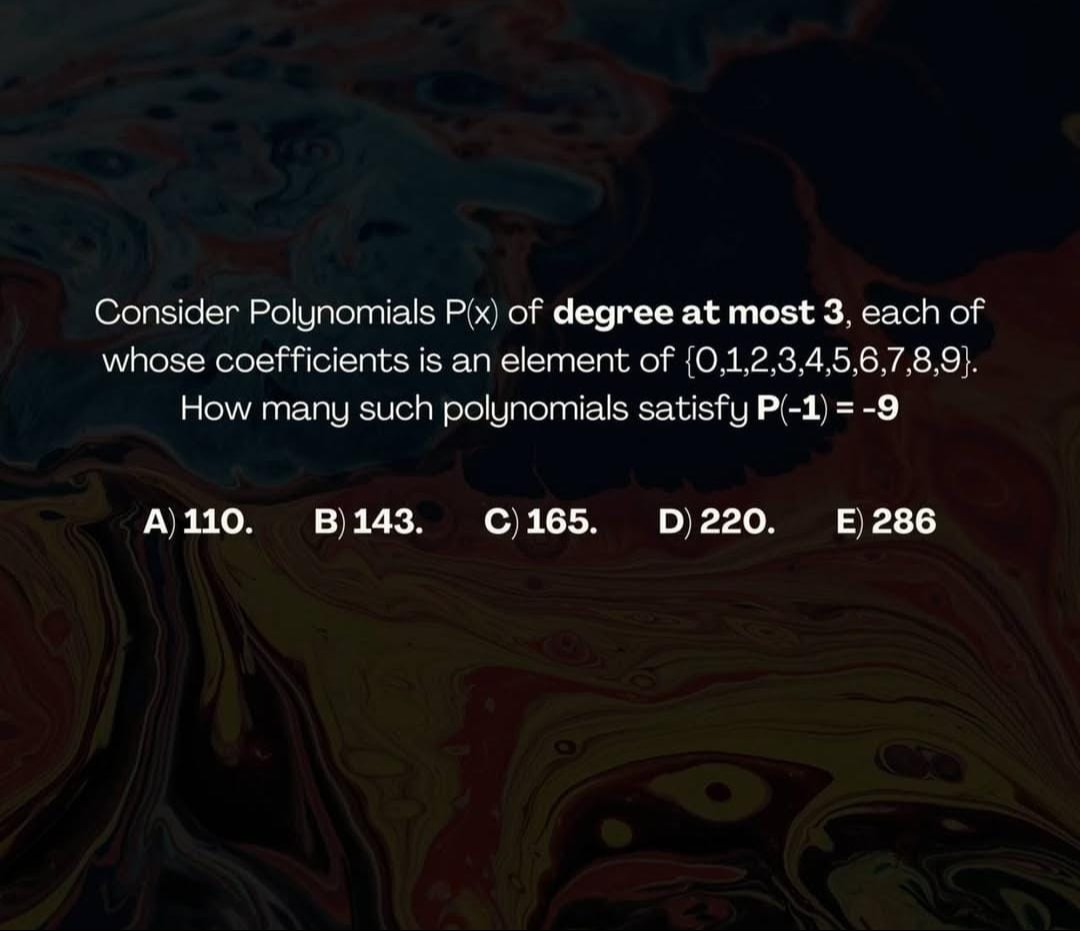Question
Question: Consider Polynomials P(x) of **degree at most 3**, each of whose coefficients is an element of {0,1,...
Consider Polynomials P(x) of degree at most 3, each of whose coefficients is an element of {0,1,2,3,4,5,6,7,8,9}.
How many such polynomials satisfy P(-1) = -9

110
143
165
220
286
220
Solution
The polynomial P(x) is of degree at most 3, so it can be written as:
P(x)=ax3+bx2+cx+d
The coefficients a, b, c, d are elements of the set {0, 1, 2, 3, 4, 5, 6, 7, 8, 9}.
We are given the condition P(-1) = -9. Substitute x = -1 into the polynomial:
P(−1)=a(−1)3+b(−1)2+c(−1)+d
P(−1)=−a+b−c+d
So, we have the equation:
−a+b−c+d=−9
Rearranging the terms, we get:
b+d=a+c−9
Let S1=b+d and S2=a+c. The equation becomes S1=S2−9.
Since a, b, c, d are integers from 0 to 9, the possible range for S1 and S2 is:
Minimum sum: 0+0=0 Maximum sum: 9+9=18 So, 0≤S1≤18 and 0≤S2≤18.
From S1=S2−9: Since S1≥0, we must have S2−9≥0⟹S2≥9. Since S1≤18, we must have S2−9≤18⟹S2≤27. Combining with S2≤18, the valid range for S2 is 9≤S2≤18.
Now, we need to find the number of ways to obtain a sum k from two coefficients chosen from {0, 1, ..., 9}. Let this be N(k). For two non-negative integers x,y such that x,y∈{0,1,...,n}, the number of solutions to x+y=k is:
- If 0≤k≤n: k+1 ways
- If n<k≤2n: 2n−k+1 ways
In our case, n=9. So, N(k) is:
- For 0≤k≤9: N(k)=k+1
- For 10≤k≤18: N(k)=2×9−k+1=19−k
We need to sum the product of the number of ways to get S2 and the number of ways to get S1=S2−9, for all valid values of S2. The total number of polynomials is ∑S2=918N(S2)×N(S2−9).
Let's calculate the terms:
- If S2=9: S1=0. N(9)=9+1=10. N(0)=0+1=1. Product = 10×1=10.
- If S2=10: S1=1. N(10)=19−10=9. N(1)=1+1=2. Product = 9×2=18.
- If S2=11: S1=2. N(11)=19−11=8. N(2)=2+1=3. Product = 8×3=24.
- If S2=12: S1=3. N(12)=19−12=7. N(3)=3+1=4. Product = 7×4=28.
- If S2=13: S1=4. N(13)=19−13=6. N(4)=4+1=5. Product = 6×5=30.
- If S2=14: S1=5. N(14)=19−14=5. N(5)=5+1=6. Product = 5×6=30.
- If S2=15: S1=6. N(15)=19−15=4. N(6)=6+1=7. Product = 4×7=28.
- If S2=16: S1=7. N(16)=19−16=3. N(7)=7+1=8. Product = 3×8=24.
- If S2=17: S1=8. N(17)=19−17=2. N(8)=8+1=9. Product = 2×9=18.
- If S2=18: S1=9. N(18)=19−18=1. N(9)=9+1=10. Product = 1×10=10.
Summing these products: Total = 10+18+24+28+30+30+28+24+18+10 Total = (10+10)+(18+18)+(24+24)+(28+28)+(30+30) Total = 20+36+48+56+60 Total = 56+104+60 Total = 160+60=220.
